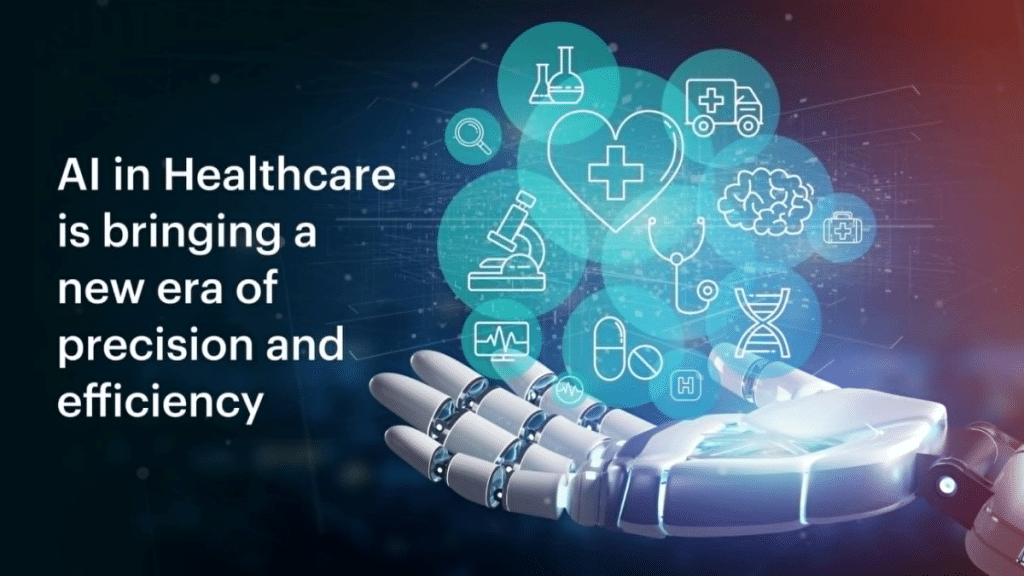Artificial Intelligence (AI) has emerged as a transformative force in different industries, and healthcare is no exception. In the healthcare sector, from diagnostics and treatment planning to patient care and administrative workflows, AI is driving a new era of precision and efficiency, which promises to revolutionize the way healthcare is delivered. The AI development services address complex challenges, like rising costs, increasing patient demands, and the need for better accuracy in clinical decision-making.
Revolutionizing Diagnostics
One of AI’s most well-known uses in healthcare is diagnostics. Traditional diagnostic processes often rely on the subjective interpretation of medical data and images, which can lead to errors. However, AI’s ability to analyze vast datasets accurately and quickly has introduced a paradigm shift.
For instance, AI-powered algorithms are now used to detect anomalies in medical imaging, like MRIs, CT Scans, and X-rays. These algorithms can identify patterns that the human eye can overlook or ignore, leading to accurate and earlier diagnoses. For example, in oncology, AI tools have demonstrated exceptional capabilities in identifying early signs of cancer, often achieving accuracy rates comparable to or surpassing those of experienced radiologists.
Furthermore, AI-driven diagnostic systems are becoming more instrumental in pathology. Analyzing digital slides helps pathologists detect diseases like cardiovascular conditions, diabetes, and infectious diseases by enhancing diagnostic precision and reducing turnaround times.
Enhancing Treatment Planning
AI plays an important role in treatment planning and personalized medicine. With advancements in genomics and molecular biology, healthcare providers are increasingly adopting AI to tailor treatments based on individual patient profiles.
Machine learning models can analyze a patient’s genetic makeup, lifestyle, and medical history to recommend personalized treatment regimens. For example, in oncology, AI systems can suggest targeted therapies by identifying genetic mutations and predicting how patients might respond to specific drugs. This not only improves treatment efficacy but also minimizes adverse effects.
Moreover, AI-driven platforms assist in drug discovery and development. Traditional drug development is expensive and time-consuming, often taking over a decade and billions of dollars. AI accelerates this process by identifying potential drug candidates, predicting their efficacy, and optimizing clinical trials. Companies that use AI development services for drug discovery are already witnessing significant reductions in development timelines.
Transforming Patient Care
Patient care is another domain in which AI is making an impressive impact. Virtual health assistants and chatbots powered by AI are enhancing patient engagement and support. These tools provide 24/7 assistance by answering queries, scheduling appointments, and offering medication reminders, thereby improving patient adherence and satisfaction.
In hospitals, AI-powered systems optimize workflows and resource allocation. Predictive analytics helps predict patient admission rates, ensure adequate staffing, and reduce emergency room congestion. Robotic process automation organizes administrative tasks like billing, coding, and claim processing, allowing healthcare professionals to focus more on patient care.
Bridging Gaps in Global Healthcare
AI’s potential to bridge gaps in global healthcare is majorly noteworthy. In underserved and resource-constrained regions, access to qualified medical professionals is often limited. AI-powered diagnostic tools and telemedicine platforms are helping to address this disparity by providing remote consultations and automated diagnostic support. For example, AI applications in smartphone-based ophthalmology and dermatology enable non-specialist healthcare workers to screen for diseases and refer patients for advanced care when required.
Additionally, AI is playing a pivotal role in combating public health crises. During the COVID-19 pandemic, AI models were used to track the spread of the virus, predict outbreaks, and analyze vaccine efficacy. Such apps underscore AI’s capacity to strengthen global health surveillance and response systems.
Overcoming Challenges
While AI has many benefits in healthcare, its adoption is not without challenges. Data privacy and security remain critical concerns, as AI systems rely heavily on access to sensitive patient information. Ensuring compliance with regulations like GDPR and HIPAA is important to safeguard and test data.
Another major challenge is integrating AI into existing healthcare workflows. Resistance to change, lack of technical expertise, and the need for substantial investment in infrastructure can hinder adoption. Ethical considerations, like algorithmic bias and the potential displacement of healthcare jobs, require governance and careful attention.
To overcome these challenges, collaborative efforts between technology developers, policymakers, and healthcare providers are important. Investing in AI literacy programs for healthcare professionals and establishing an ethical framework can pave the way for responsible AI implementation.
The Road Ahead
As AI continues to evolve, its potential to transform healthcare is immense. Emerging technologies like NLP and LLM development enable AI to analyze unstructured data, like clinical notes and research papers, to uncover insights that can inform decision-making.
Advancements in robotics and autonomous systems are opening new avenues for AI in rehabilitation and surgery. The integration of AI with other cutting-edge technologies like AR and blockchain holds promise for even greater innovation.
In conclusion, AI is redefining the healthcare landscape by enhancing efficiency, precision, and accessibility. Whether through AI app development or services, the healthcare industry is embracing innovation to address currency challenges and lay the foundation for a future where quality is accessible to all.
